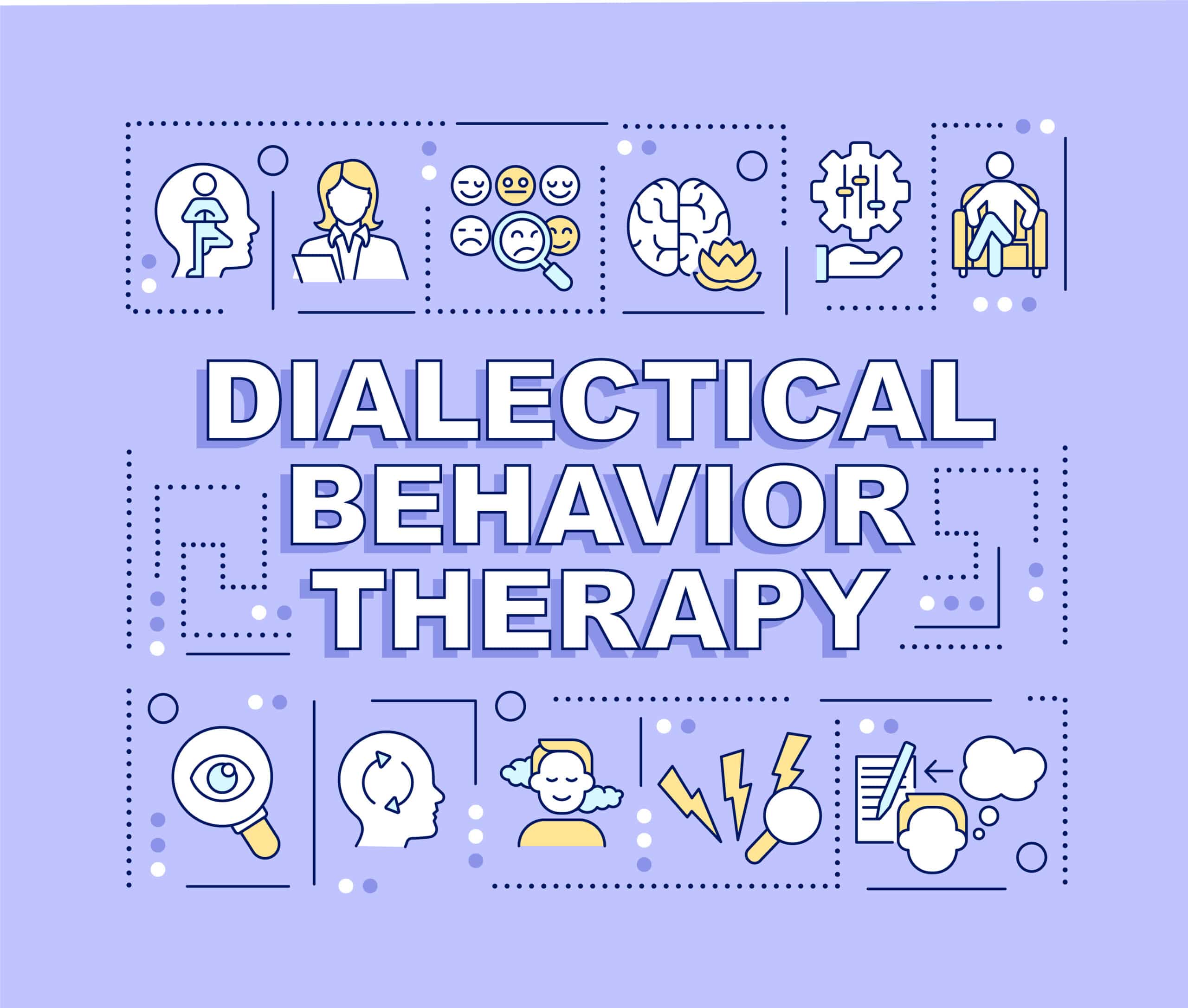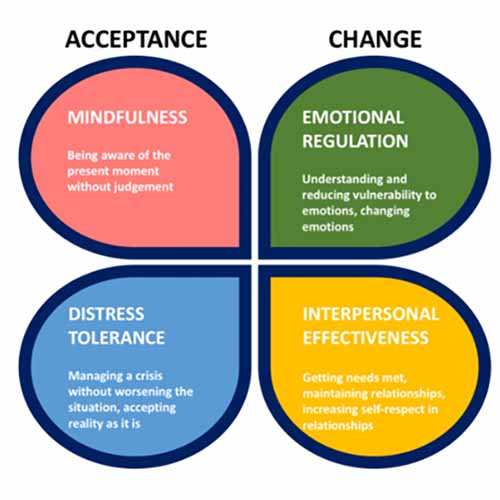Trip to Self-Discovery: DBT London's Caring Therapy
Trip to Self-Discovery: DBT London's Caring Therapy
Blog Article
Nurturing Emotional Durability and Self-Awareness With Dialectical Behaviour Treatment (Dbt) Providers: Your Trip to Inner Peace
In the quest of psychological durability and self-awareness, the utilization of Dialectical Behaviour Treatment (DBT) services uses a structured technique that incorporates different basic principles to promote inner peace. Understanding the core tenets of DBT supplies a solid foundation for people seeking to browse their emotional landscape with better clarity and control.
Understanding DBT Basics
An in-depth understanding of Dialectical Actions Therapy (DBT) basics is essential for comprehending its concepts and application in emotional strength - DBT London. DBT is a therapeutic technique created by Marsha M. Linehan to help people having problem with emotional dysregulation, frequently related to conditions like borderline personality problem. The core concepts of DBT focus on 4 primary components: mindfulness, distress tolerance, feeling regulation, and interpersonal effectiveness. Mindfulness is the structure of DBT, stressing existing minute understanding without judgment. Distress resistance skills furnish individuals to withstand and survive crises without making impulsive decisions. Emotion regulation techniques help individuals recognize and take care of extreme emotions successfully. Finally, interpersonal effectiveness skills educate people exactly how to assert their needs while maintaining relationships. By recognizing these fundamental facets of DBT, people can cultivate psychological strength by discovering to manage their feelings, navigate relationships, and deal with stressful circumstances much more effectively. This fundamental understanding establishes the stage for the successful application of DBT concepts in promoting psychological wellness and inner tranquility.

Developing Emotional Guideline Skills
Developing proficiency in emotional law abilities is vital for boosting one's capability to navigate challenging situations and take care of extreme emotions efficiently. Emotional law entails the capability to recognize, understand, and handle one's feelings in a constructive and healthy and balanced fashion. By refining these skills, people can grow a greater feeling of self-constraint and durability in the face of difficulty.
One secret aspect of developing psychological guideline skills is finding out to acknowledge and label various emotions accurately. This self-awareness makes it possible for individuals to determine the source of their sensations and respond appropriately. Furthermore, practicing mindfulness techniques can aid individuals remain existing in the minute and prevent frustrating feelings from hijacking their thoughts and activities.
Moreover, executing healthy and balanced coping techniques, such as deep breathing workouts, dynamic muscle mass leisure, or grounding techniques, can offer individuals with reliable tools to regulate their emotions throughout times of distress. By consistently practicing these skills, people can build a solid structure for psychological durability and self-awareness, ultimately promoting internal tranquility and wellness.

Enhancing Interpersonal Effectiveness
With a solid foundation in emotional regulation skills, people can currently concentrate on sharpening their social effectiveness to navigate social interactions with greater ease and success. Social performance, a vital part of Dialectical Behavior Treatment (DBT), outfits people with the needed tools to communicate assertively, set boundaries, and construct much healthier partnerships. By learning to share viewpoints and needs plainly while valuing the point of views of others, individuals can cultivate more purposeful links and decrease conflicts in their communications.

Ultimately, improving interpersonal effectiveness through DBT equips people to browse different social contexts with authenticity, durability, and empathy, cultivating even more meeting and unified partnerships in their lives.
Exercising Mindfulness Techniques
Mindfulness methods play a critical role in enhancing emotional law and promoting self-awareness in individuals going through Dialectical Behaviour Treatment (DBT) By fostering present-moment recognition without judgment, mindfulness equips individuals to observe their ideas and sensations with acceptance, bring about a much deeper understanding of their inner experiences. With routine practice of mindfulness methods such as mindful breathing, body scans, and conscious observation, individuals can create an increased sense of self-awareness and psychological durability.
One fundamental mindfulness strategy used in DBT is the "wise mind" principle, which motivates people to integrate their psychological and reasonable minds to make well balanced decisions - DBT London. This technique allows individuals to browse emotional triggers with a calmer and much more rational approach, reducing spontaneous reactions. Additionally, mindfulness strategies help in grounding people in the here and now moment, steering them far from rumination on past occasions or anxiousness regarding the future
Structure Distress Resistance Strategies
To boost emotional resilience in people undergoing Dialectical Practices Therapy (DBT), it is necessary to concentrate on building reliable distress tolerance approaches. Establishing these strategies is critical for individuals to navigate via difficult scenarios without becoming overwhelmed. Distress resistance abilities help people deal and withstand with intense feelings, crises, or scenarios where they might be tempted to involve in damaging actions.
One key distress tolerance approach often showed in DBT is the ACCEPTS phrase, which stands for Tasks, Adding, Comparisons, Emotions, Pressing away, Thoughts, and Feelings. These abilities provide people with a tool kit of techniques to sidetrack themselves from upsetting emotions or scenarios in a healthy way.
In addition, learning how to self-soothe with tasks like deep breathing you could try this out workouts, taking a cozy bathroom, or participating in hobbies can also help build distress tolerance. By integrating these approaches right into daily technique, people can much better take care of stress, manage feelings, and inevitably grow a better feeling of psychological strength.
Verdict
To conclude, the trip in the direction of inner tranquility through Dialectical Behaviour Treatment (DBT) includes understanding its fundamentals, creating emotional regulation abilities, boosting social performance, exercising mindfulness techniques, and building distress resistance approaches. By utilizing these methods, people can nurture emotional resilience and self-awareness, bring about a better sense of internal tranquility and wellness. DBT London. Incorporating DBT solutions into one's life can offer useful tools and resources for handling emotions and connections content properly
Comprehending the core tenets of DBT gives a strong foundation for individuals looking for to navigate their emotional landscape with higher quality and control. By understanding these basic facets of DBT, people can grow emotional resilience by discovering to manage their feelings, navigate connections, and deal with distressing circumstances a lot more successfully.Mindfulness methods play a crucial function in enhancing psychological policy and advertising self-awareness in individuals undergoing Dialectical Behavior Treatment (DBT)One essential mindfulness technique utilized in DBT is the "wise mind" principle, which encourages individuals to incorporate their reasonable and emotional minds to make balanced decisions.To boost psychological durability in individuals going Going Here through Dialectical Practices Treatment (DBT), it is necessary to focus on building effective distress tolerance techniques.
Report this page